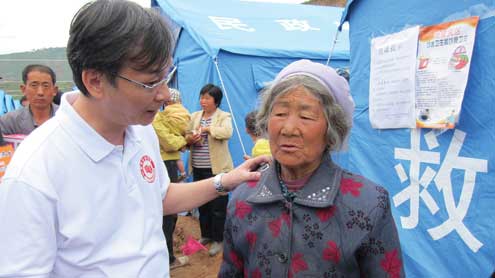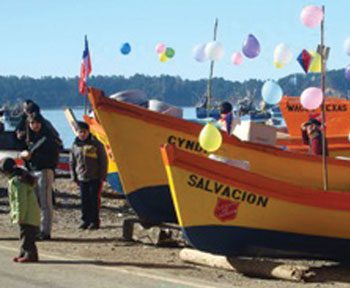Listen to this article
Listen to this article
Loading
Play
Pause
Options
0:00
-:--
1x
Playback Speed- 0.5
- 0.6
- 0.7
- 0.8
- 0.9
- 1
- 1.1
- 1.2
- 1.3
- 1.5
- 2
Audio Language
- English
- French
- German
- Italian
- Spanish
Open text
elsewhere in the world. elsewhere in the world. by. england—the salvation army’s international doctrine council (idc) recently held its semi-annual meeting at sunbury court in london. the council spent its first morning with the international social justice council; commissioner christine macmillan and dr. james read made a presentation. the agenda included a report on the recent bilateral dialogue with the world methodist council. the idc completed plans for the 2010 international theology and ethics symposium and proposals for book publications. the council, led by commissioner william w. francis, chairman, and commissioner robert street, vice-chairman, is composed of 16 members from around the world. just prior to the idc meeting, sunbury court hosted the third international dialogue between the salvation army and the world methodist council to strengthen relationships among member churches of the council and the army. issues discussed included holiness, evangelism and social justice. key areas for continuing conversation are common engagement in missional action and cultivating leadership in mission. leading the army delegation were francis, co-secretary of the dialogue, and dr. jonathan s. raymond, co-chairman, along with their methodist counterparts, bishop dr. heinrich bolleter and the rev. dr. paul w. chilcote. australia—the australia southern territory’s health information exchange is a major service offered by the salvation army crisis services. as part of the australian needle and syringe exchange program (nsep), it implements a range of public health measures to minimize the spread of blood-borne viruses amongst injecting drug users (idus) and the wider community. the program began in the late 1980s after research identified the reduction of needle sharing by idus as a key factor in limiting the spread of hiv in the whole population. thanks to the success of the nsep, australia today reports a very low incidence of hiv infection among idus—around 2 percent—which relates to the low incidence of the virus among the general population. this compares with rates of hiv infection of between 40 and 60 percent among idus in countries without needle exchange programs. amid concerns about the rising number of overdoses and cases of hepatitis c, the health information exchange is a vital service providing realistic responses for a safer community. for more information, visit singapore—through a partnership with the singapore prison department, the salvation army’s prison support services runs kids in play (kip), a program that supports children whose parents are incarcerated. currently the program team cares for 156 children from 5 – 12 years old. team volunteers seek to instill values of goodness, gentleness and faithfulness to bridge the emotional gap between the incarcerated parent and child. they build friendships with families and always invite them to salvation army sunday services. during the last quarter of 2008, kip enabled 234 clients—inmates, children, spouses and caregivers—to benefit from 23 family bonding sessions in seven institutions. the team’s work also included home visits, crisis intervention, special assistance, job referrals and pre- and post-sessions with inmates. from the singapore, malaysia and myanmar territory’s war cry, march 2009
Open context player
Close context player
Plays:-Audio plays count
elsewhere in the world. elsewhere in the world. by. england—the salvation army’s international doctrine council (idc) recently held its semi-annual meeting at sunbury court in london. the council spent its first morning with the international social justice council; commissioner christine macmillan and dr. james read made a presentation. the agenda included a report on the recent bilateral dialogue with the world methodist council. the idc completed plans for the 2010 international theology and ethics symposium and proposals for book publications. the council, led by commissioner william w. francis, chairman, and commissioner robert street, vice-chairman, is composed of 16 members from around the world. just prior to the idc meeting, sunbury court hosted the third international dialogue between the salvation army and the world methodist council to strengthen relationships among member churches of the council and the army. issues discussed included holiness, evangelism and social justice. key areas for continuing conversation are common engagement in missional action and cultivating leadership in mission. leading the army delegation were francis, co-secretary of the dialogue, and dr. jonathan s. raymond, co-chairman, along with their methodist counterparts, bishop dr. heinrich bolleter and the rev. dr. paul w. chilcote. australia—the australia southern territory’s health information exchange is a major service offered by the salvation army crisis services. as part of the australian needle and syringe exchange program (nsep), it implements a range of public health measures to minimize the spread of blood-borne viruses amongst injecting drug users (idus) and the wider community. the program began in the late 1980s after research identified the reduction of needle sharing by idus as a key factor in limiting the spread of hiv in the whole population. thanks to the success of the nsep, australia today reports a very low incidence of hiv infection among idus—around 2 percent—which relates to the low incidence of the virus among the general population. this compares with rates of hiv infection of between 40 and 60 percent among idus in countries without needle exchange programs. amid concerns about the rising number of overdoses and cases of hepatitis c, the health information exchange is a vital service providing realistic responses for a safer community. for more information, visit singapore—through a partnership with the singapore prison department, the salvation army’s prison support services runs kids in play (kip), a program that supports children whose parents are incarcerated. currently the program team cares for 156 children from 5 – 12 years old. team volunteers seek to instill values of goodness, gentleness and faithfulness to bridge the emotional gap between the incarcerated parent and child. they build friendships with families and always invite them to salvation army sunday services. during the last quarter of 2008, kip enabled 234 clients—inmates, children, spouses and caregivers—to benefit from 23 family bonding sessions in seven institutions. the team’s work also included home visits, crisis intervention, special assistance, job referrals and pre- and post-sessions with inmates. from the singapore, malaysia and myanmar territory’s war cry, march 2009
Listen to this article













